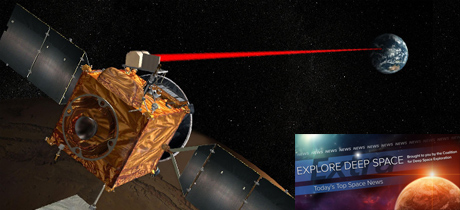In Today’s Deep Space Extra… NASA plans to include laser communications aboard the Orion capsule under development to launch astronauts on future missions of deep space exploration. New space technologies and private benefactors may open a door for non-government planetary science missions.
Human Space Exploration
Laser communications modem being developed for NASA’s Orion spacecraft
Spaceflightinsider.com (11/12): NASA is working with LGS Innovations, of Herndon, Virginia, to equip the Orion crew module with a more capable laser communications system in time for Exploration Mission-2 (EM-2), the first joint test flight of the Space Launch System (SLS) and Orion with astronauts on board. Laser communications will not hasten the time it takes for radio communications to travel long distances, like those separating the Earth and Mars, but it promises to greatly step up the amount of data that can be forwarded.
Astronaut Rusty Schweickart looks back on Apollo 9, and to the next asteroid Impact
Space.com (11/12): NASA astronaut Rusty Schweickart explains those moments during his March 1969 Apollo 9 mission that gave him a new outlook on the preciousness of life on Earth. The events eventually led to his founding of the B612 Foundation to increase awareness of the Earth’s vulnerability to asteroid collisions.
Behind-the-scenes audio from Apollo 11 mission made public for first time
Ars Technica (11/12): NASA has digitized and archived backroom audio conversations during the Apollo 11 inaugural Moon landing mission, which will mark its 50th anniversary in July 2019. Some 19,000 hours of back channel conversations between those involved in the historic mission and other spaceflights have been located, digitized and processed for future generations. “Landing on the Moon wasn’t just Neil Armstrong. It was an entire team of people working together to make it happen, and all of this audio is their side of the story,” explains Greg Wiseman, a NASA Johnson Space Center (JSC) audio engineer involved in the project.
Space Science
NASA to shut down astrobiology virtual institute
SpaceNews.com (11/12): In order to inject more flexibility into its astrobiology research, NASA will discontinue its sponsorship of a virtual Astrobiology Institute in favor of a lineup of research coordination networks. Five RCNs are planned, each in place by the end of 2019 to advance the search for life beyond Earth.
Amateur astronomers find a bright new comet
Spaceweather.com (11/12): Comet Machholz-Fujikawa-Iwamoto, a fresh comet discovery will make its closest approach to Earth late this month. Visible in the constellation Virgo with telescopes, it’s not yet clear whether it will visible to the naked eye.
Other News
Spaceplanes: The triumph of hope over experience
The Space Review (11/12): Will the commercial launch industry move beyond a tradition of the vertical launch? John Holloway, developer of a reusable launch vehicle concept, sees continued major obstacles to the development of a single stage space plane with runway launch and landing capabilities.

